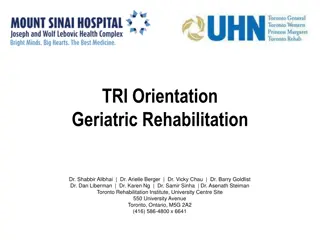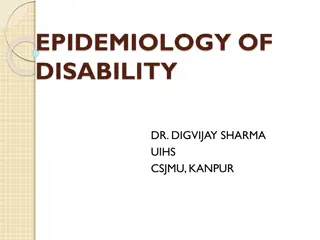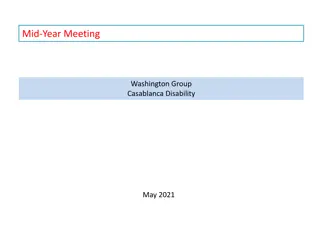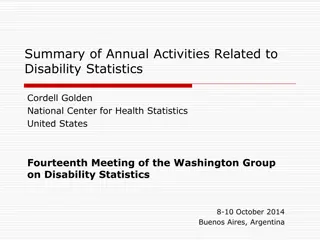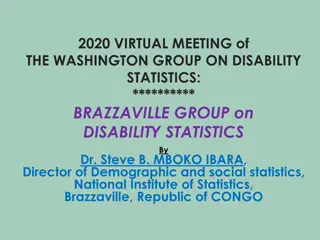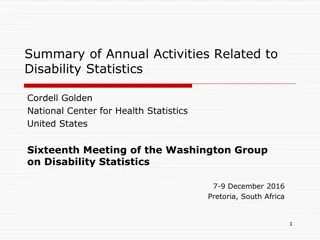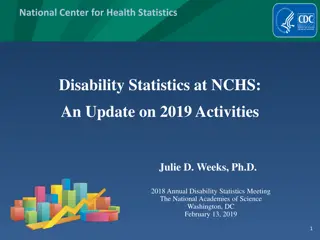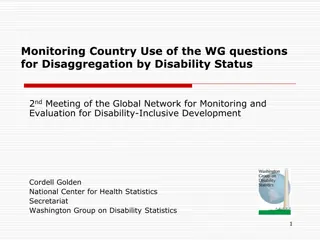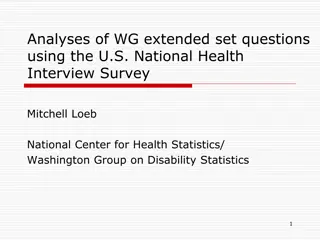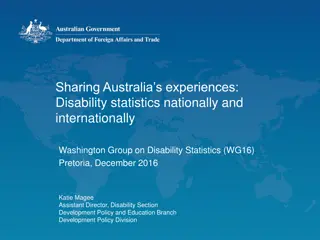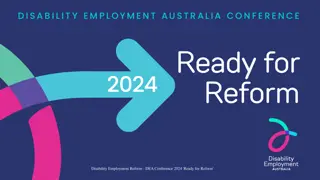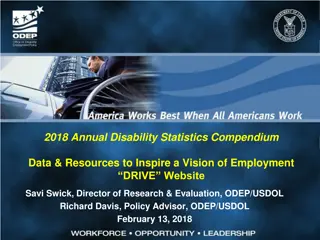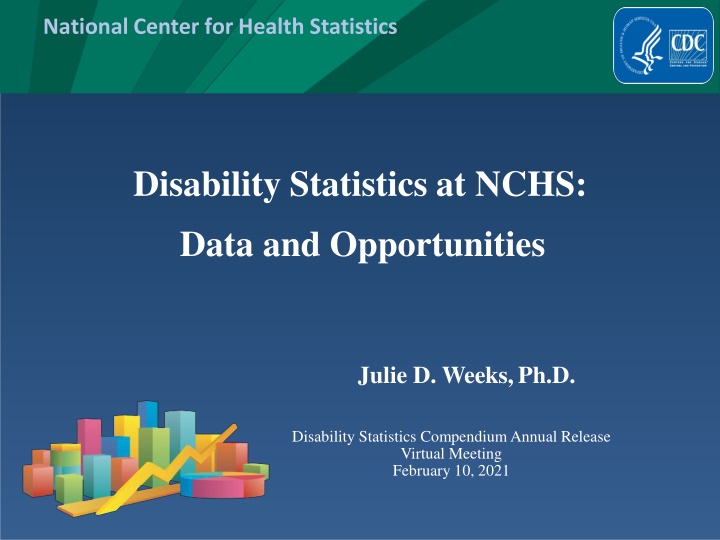
Disability Statistics at National Center for Health Statistics
National Center for Health Statistics provides valuable data through surveys like National Health and Nutrition Examination Survey and National Health Interview Survey to assess health, disability status, and other related information of the U.S. population. These surveys combine interviews and physical examinations to gather comprehensive health data.
Download Presentation

Please find below an Image/Link to download the presentation.
The content on the website is provided AS IS for your information and personal use only. It may not be sold, licensed, or shared on other websites without obtaining consent from the author. If you encounter any issues during the download, it is possible that the publisher has removed the file from their server.
You are allowed to download the files provided on this website for personal or commercial use, subject to the condition that they are used lawfully. All files are the property of their respective owners.
The content on the website is provided AS IS for your information and personal use only. It may not be sold, licensed, or shared on other websites without obtaining consent from the author.
E N D
Presentation Transcript
National Center for Health Statistics Disability Statistics at NCHS: Data and Opportunities Julie D. Weeks,Ph.D. Disability Statistics Compendium Annual Release Virtual Meeting February 10, 2021 1
National Center for Health Statistics Data Systems Data Systems National Vital Statistics System National Health and Nutrition Examination Survey National Health Interview Survey National Health Care Surveys
The National Health and Nutrition Examination Survey Designed to assess the health and nutritional status of the U.S. civilian noninstitutionalized population. The survey is unique in that it combines interviews and physical examinations. Annual data collection from 5,000 adults and children Redesigned questionnaire fielded in January 2019 Two-year release cycle (2019-2020) Questionnaires for 2019-2020 now available online Provides information on persons with disability: Interview component: demographic, socioeconomic, dietary, health Examination component: medical, dental, and physiological measurements, as well as laboratory tests Examples: Hypertension, weight status, cholesterol, drugs/opioids
The National Health Interview Survey The principal source of information on the health of the civilian noninstitutionalized population of the United States since 1957 Annual data collection from 30,000 adults and 10,000 children Redesigned questionnaire fielded in January 2019 Data release in September 2020 Disability now part of the Early Release program Provides information on the health status of persons with disability, as well as: Demographics Health care access and utilization, and insurance Health behaviors and risk factors Participation (social, work, civic)
National Health Interview Survey Jan 2019 Newly-redesigned NHIS content fielded Sept 2020 First release of public use data with full complement of redesigned disability content: Washington Group Disability for Adults Extended Set on Functioning, Short Set on Functioning, Short Set Enhanced Washington Group Disability for Children Child Functioning Module (2-4 and 5-17 years) Activity Limitation (work, social, participation) Mental Health (K-6, PHQ-8, GAD, for children SDQ) Provides additional information on persons with disability: Socio-demographic, living arrangements Health, health behaviors and risk factors Health care access and utilization, and insurance
NHIS Publication Releases (September-December 2020)
The NHIS Early Release Program Provides estimates of key health indicators, analytic reports, and preliminary microdata files on an expedited schedule. Interactive data query system: biannual or quarterly estimates.
Health, U.S. Functional Limitation among adults 18+, U.S. 2010-2018 SOURCE: NCHS, National Health Interview Survey (NHIS).
Healthy People 2030 Overall Health and Well-Being Measures Overall Health and Well-Being Measures (OHMs) are broad, global outcome measures intended to assess the Healthy People 2030 vision. OHMs can be used to summarize and evaluate progress toward achieving Healthy People objectives.
HP 2030 Data Table Template Total Sex Male Female Race/Ethnicity American Indian/Alaska Native only Asian only Native Hawaiian/Pacific Islander only Black or African American only White only 2 or more races Hispanic or Latino Not Hispanic or Latino American Indian/Alaska Native only, not Hispanic or Latino Asian only, not Hispanic or Latino Native Hawaiian/Pacific Islander only, not Hispanic or Latino Black only, not Hispanic or Latino White only, not Hispanic or Latino 2 or more races not Hispanic or Latino Age [Standard groups by data system] Educational Attainment < High school High school Some college or Associates degree 4-year college degree or more Family Income (percent poverty threshold) <100 100-199 200-399 >=400 Health Insurance Status Insured Private Public Uninsured Geographic Location or Region Metropolitan Nonmetropolitan Marital Status Married/Cohabiting partner Divorced or Separated/Widowed Never married Country of Birth US Outside US Veteran Status Veteran Non-Veteran Disability Status People with disabilities People without disabilities Sexual Orientation Straight Straight, Male Straight, Female Gay/Lesbian Gay, Male Gay/Lesbian, Female Bisexual Bisexual, Male Bisexual, Female Gender Identity [Standard groups by data system] Note: If data are not collected, analyzed, or available (or need to be suppressed) for a particular demographic group by a data source, the demographic label will still be shown and a symbol or acronym will be displayed to indicate the reason data are not shown.
Resources Washington Group on Disability Statistics http://www.washingtongroup-disability.com/ National Health Interview Survey https://www.cdc.gov/nchs/nhis/index.htm National Health and Nutrition Examination Survey https://www.cdc.gov/nchs/nhanes/index.htm NCHS Data Linkage Program https://www.cdc.gov/nchs/data-linkage/index.htm Health, U.S. https://www.cdc.gov/nchs/hus/index Healthy People 2030 https://health.gov/healthypeople






